How to give Safari a privacy boost with DuckDuckGo Privacy Essentials

In this day and age, you should be doing everything in your power to boost the security and privacy of your browsing efforts. If you don't, you're being tracked, logged, and monitored by just about every site you visit.
For some, that is simply not acceptable.
If that sounds like you, and you're a macOS Safari user, you owe it to yourself to give Apple's web browser a helping hand with DuckDuckGo Privacy Essentials. This browser add-on helps prevent online tracking by automatically blocking third-party trackers and even grades each site's privacy from A-F (A being trustworthy and F being absolutely not trustworthy).
I'm going to show you how to install and use this free Safari extension so you can extend the privacy of Safari. All you'll need is an Apple laptop or desktop and the Safari browser. Now let's add some privacy protection to your favorite browser.

Adding the DuckDuckGo Privacy Essentials to Safari
Before installing, make sure to close Safari. Once you've done that, open the Apple App Store and search for DuckDuckGo in the search bar. You should see an entry for DuckDuckGo Privacy Essentials. Click on that entry and then click Get ( Figure 1 ).
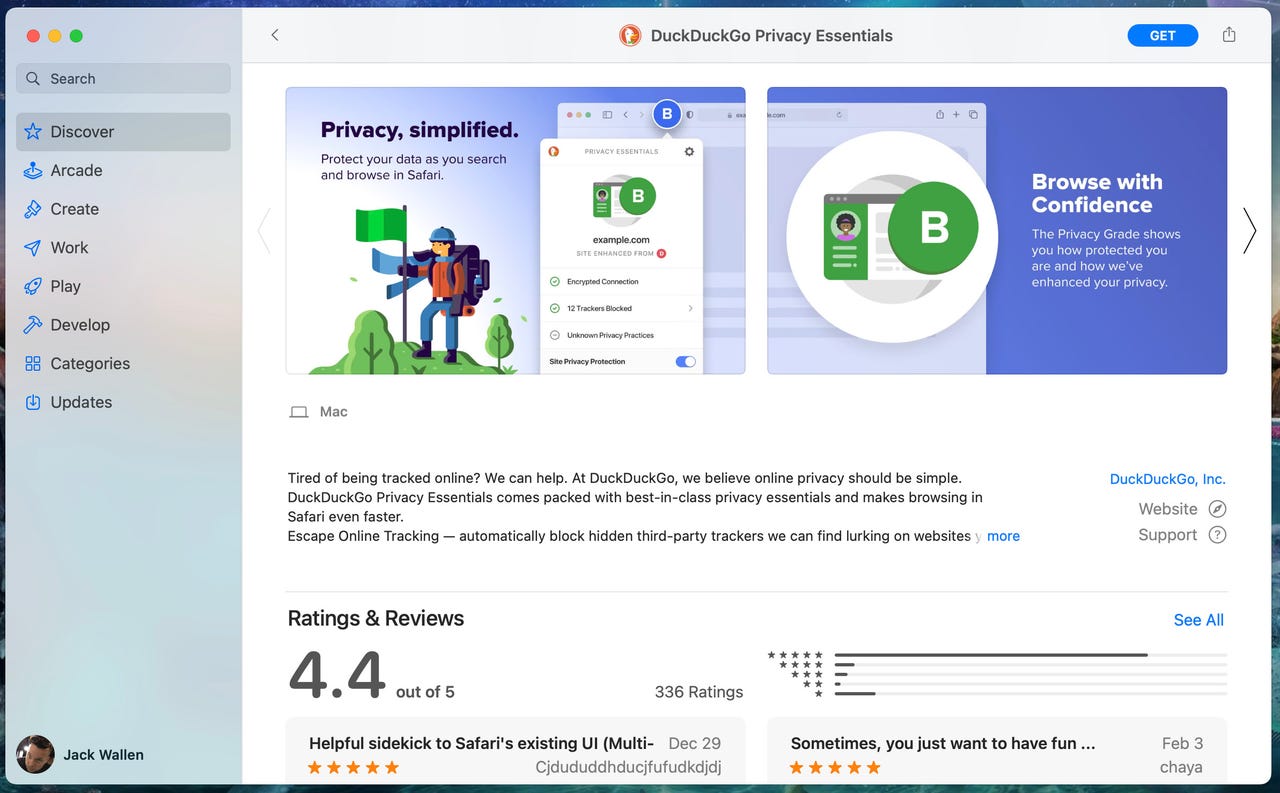
The DuckDuckGo Privacy Essentials entry in the Apple App Store.
Next, click Install and, when prompted, either tap the fingerprint sensor (if your hardware has one) or type your user password. The installation will begin and finish very quickly.
Once the installation completes, close the App Store and open Safari. Near the top of the browser window, you'll see a notification warning that you need to turn on both "Privacy Protection" and "Privacy Dashboard" in the Extension Preferences ( Figure 2 ).
The next step is enabling these two features in Safari.
Click Turn On and Review and then, in the next window ( Figure 3 ), click the checkboxes for both Privacy Dashboard and Privacy Protection.
Enabling both features for DuckDuckGo Privacy Essentials in Safari.
You'll be prompted to okay the enabling of the features, so make sure to click Turn On when asked.
Close and restart Safari. Next, visit any website you choose and you'll notice the small circle directly to the left of the address bar will display a grade for the site ( Figure 4 ).
Facebook earned a C privacy grade.
If you click on the grade a new popup will appear with all of the information you need to see. As you can tell, Facebook was upgraded from a previous D listing and DuckDuckGo has blocked 1 tracker ( Figure 5 ).
DuckDuckGo blocked a single tracker from Facebook.
You do not have to do anything to prevent DuckDuckGo from blocking trackers in Safari. This one-two punch of both Safari and DuckDuckGo tracker blocking should go a long, long way to keep your browsing experience safe from trackers keeping tabs on your comings and goings within the browser.
If you're concerned about your privacy, you should consider the addition of the DuckDuckgo Privacy Essentials extension a must.
Jack Wallen: Here's how to...
The best vpns for iphone and ipad: expert tested, the best mobile vpns: expert tested, brave search engine adds privacy-focused ai - no google or bing needed.
How-To Geek
How to switch to duckduckgo, a private search engine.
Have you tried DuckDuckGo yet? If you're sick of online tracking and ad targeting, give it a try. Switching from Google is easy---here's how.
Quick Links
Most browsers already include duckduckgo as a search option, install the duckduckgo browser extension, use duckduckgo for media, news, maps, and directions, get answers just like with google, use bangs to search specific websites, don't forget the duckduckgo mobile app, better privacy while browsing the web.
DuckDuckGo is a privacy-focused search engine that's been online since 2008. Find websites, maps, videos, news, and more---without tracking your searches and serving you targetted ads. Here's how to make the switch from Google, Bing, or any other search engine.
DuckDuckGo has been gaining ground for over a decade, finally breaking through to the "mainstream" in September of 2014 when Apple offered it as a default search engine option in Safari for iOS 8 and OS X Yosemite. Later, in November of the same year, Mozilla added it to Firefox 33.1.
Related: What Is DuckDuckGo? Meet the Google Alternative for Privacy
Since then, almost every major browser has recognized DuckDuckGo by making it an optional default search engine. This includes Chrome, Firefox, Safari, Edge, and Opera.
Google Chrome
Launch Chrome, click on the "three dots" menu icon in the top-right corner of the window, and click "Settings."
Choose "Search engine" in the list on the left of the screen. Click on the drop-down box next to "Search engine used in the address bar" and choose DuckDuckGo.
Mozilla Firefox
Launch Firefox, click on the "three lines" hamburger menu icon in the top-right corner of the window, then click "Preferences."
Click on "Search" in the menu to the left of the screen, then under "Default Search Engine," click the drop-down box and choose DuckDuckGo.
Microsoft Edge
Launch Edge and click on the "three dots" menu button in the top-right corner of the window, then select "Settings." Click on "Privacy, Search and Services" in the menu that appears on the left, and scroll down to the "Services" menu and choose "Address bar and search."
From here, click the dropdown menu next to "Search engine used in the address bar" and choose DuckDuckGo.
Apple Safari
On a Mac, launch Safari, click "Safari" in the menu bar at the top of the screen, then click "Preferences." You can also use the Command+, shortcut to quickly bring up Safari's Preferences. Click on the Search tab, then choose DuckDuckGo under the "Search engine" drop-down box.
In Safari for iPhone and iPad, launch the Settings app and tap "Safari." Tap "Search Engine" and choose DuckDuckGo from the list.
Launch Opera, then click on the Settings "cog" button in the sidebar on the left of the screen. Under "Basic" settings, scroll down until you see "Search engine" and a drop-down box. Select DuckDuckGo from the list.
Using Another Browser?
DuckDuckGo is available as a search engine option in a broad range of niche browsers .
If simply switching your search engine to DuckDuckGo isn't enough, you can go a step further and install the DuckDuckGo Privacy Essentials browser extension instead. The extension is available for Chrome , Firefox , Safari , Edge , and Opera .
The extension blocks tracker networks by default, so advertisers will have a much harder time tracking you across the web. You'll also get an idea of who is trying to track you. The extension forces websites to use an encrypted connection (denoted by https:// in the address bar ) where possible to help hide your browsing habits from ISPs and other snoopers.
The extension also offers to make your default search engine DuckDuckGo (if you haven't done that already) and awards a privacy score to websites you visit through a collaboration with Terms of Service Didn't Read .
Just like Google and other big search engines, DuckDuckGo allows you to filter results by type, including videos and images. After you've searched for something, you can click on the various filters at the top of the page, just like you would in Google.
In addition to media searches, DuckDuckGo can also show you news results, recipes, and places. You can search for "pizza near me," then share your location to get localized results on a map. You can also just use DuckDuckGo as a mapping tool for directions or reference thanks to Apple's MapKit integration.
To do this, either search for "map of Australia" (replacing Australia with wherever it is that you're searching for) or search for the place name, then click on Maps. Though DuckDuckGo uses Apple's map API, no identifying information is shared with Apple, so your privacy remains unaffected.
Since this is the same mapping solution built into macOS and seen on the iPhone and iPad, you can use it to get directions, view satellite imagery, or see businesses on a map. Click on the map pin in the top-right corner of the page to share your location (DuckDuckGo promises not to store this data).
When you ask Google a question, you often get a reply in the form of a snippet of relevant information at the top of the search results. DuckDuckGo performs a similar task, so try asking questions to get what the search engine calls Instant Answers.
This also applies to functions found in other search engines, like simple math calculations ("what is 2+2"), unit conversion ("2oz in grams"), and exchange rates ("10 USD in AUD"). You can also use DuckDuckGo to define words ("define malware") or to find synonyms ("thesaurus happy").
Bangs are qualifiers that you can add to your search query to limit your search results to a particular website. For example, to search How-To Geek, you can add !howtogeek to your search query, e.g. "!howtogeek windows networking".
There are thousands of bangs available for all sorts of websites, from the obvious ones like !youtube and !reddit to niche services. If you use a website that doesn't currently have a bang, you can submit it . Keep in mind that DuckDuckGo has previously purged a lot of bangs for liability reasons, including websites that enable piracy.
You can even quickly access Google from DuckDuckGo if you find yourself needing to perform the occasional search that just needs Google. The Google bang is a simple !g. For example, you can type "!g example" to search for "example" on Google.
Last, but certainly not least, is the DuckDuckGo mobile app, available for both iPhone and iPad as well as Android . This app is optional, and you can likely already switch to DuckDuckGo in your mobile browser of choice, whether it's Chrome, Firefox, or Safari.
It's most comparable to the Google app for iPhone and iPad in that it functions as a web browser, except that it replaces Google's data collection and tracking for DuckDuckGo's private browsing approach.
The app makes it easy to quickly switch your default browser to DuckDuckGo as well as providing many of the other benefits found in the browser extension. This includes making it as difficult as possible for advertisers to track you and providing forced encryption and a privacy grade for each website you visit.
The browser also includes a Fire Button, which burns your entire browsing history and currently open tabs in a single tap. You can also secure the browser with a fingerprint or facial recognition for added security.
Of course, you can also use DuckDuckGo as your default search engine in mobile browsers like Safari and Google Chrome.
Google is an advertising company. The more it knows about you, the better it can serve you relevant advertisements. This is why the company tracks so much of what you do online. Google's algorithms take into account everything from the videos you watch on YouTube to the websites you browse that use Google Analytics to build a profile of your interests for advertisers to target.
DuckDuckGo makes money from ads served by Microsoft and affiliates like Amazon and eBay, but they do so in a manner that doesn't track or identify you. Learn more about how DuckDuckGo makes its money .
While Google may be the more powerful search engine, using it comes at the cost of privacy. Ditching Google in favor of a search engine like DuckDuckGo is one small change you can make for a more private online experience.
Looking for something a little different? Take a look at Ecosia, a not-for-profit search engine that uses its revenue to plant trees .
Related: What Is Ecosia? Meet a Google Alternative That Plants Trees
How to use DuckDuckGo: Everything you need to know
What DuckDuckGo is, and isn't, good for
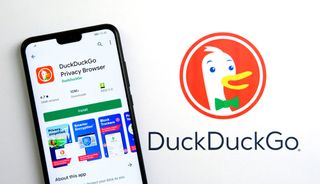
If privacy is what you're after and you want to get away from using Google, DuckDuckGo is a great alternative. The service focuses on putting privacy first, from internet browsing to email forwarding . However, the results aren't as relevant or robust, so you may not always find exactly what you're looking for.
Thousands of privacy-conscious users have already made the switch from messaging platforms like WhatsApp to more secure-seeming options such as Signal and Telegram .
At the same time, many people may be opting to use DuckDuckGo instead of Google or Bing for web searches, likely because the lesser-known search engine does not collect user data or track what you search.
DuckDuckGo has seen more than 4 million users install its apps and browser extensions, making it their default search engine, and you can too.
Here's how to switch to — and use — DuckDuckGo.
How to add DuckDuckGo to your browser
If you simply want to try out DuckDuckGo, type duckduckgo.com into your browser's address bar and enter your search query. Use it for a while and see if you like it. Once you're ready to make the switch, you can either select DuckDuckGo as your default search engine or add the appropriate app or extension to your browser.
Adding DuckDuckGo to Chrome
Chrome users have two options for using DuckDuckGo on the desktop. The simplest option, if you're looking only for the private search function, is to make DuckDuckGo the default search engine.
Sign up to get the BEST of Tom’s Guide direct to your inbox.
Upgrade your life with a daily dose of the biggest tech news, lifestyle hacks and our curated analysis. Be the first to know about cutting-edge gadgets and the hottest deals.
Go to Settings (the three vertical dots at the top right of your browser bar) > Search engine > Manage search engine. Click the vertical dots next to DuckDuckGo and select Make default. This will make DuckDuckGo the default search engine in your address search bar as well.
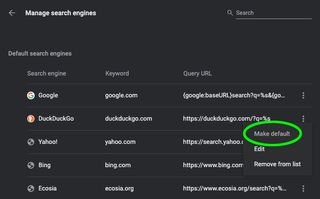
An alternative for extra privacy is to install the DuckDuckGo Chrome extension . This will block hidden trackers and connect you to encrypted versions of websites if available.
If you change your mind about DuckDuckGo, both the default setting and the browser extension can be disabled in Chrome's settings.
Adding DuckDuckGo to Firefox
To make DuckDuckGo your default search engine in Firefox, toggle open the Settings options with the three horizontal lines to the far right of your address bar. Click Preferences and open the Default Search Engine drop-down menu to select DuckDuckGo. This will change the settings for search in your address bar.
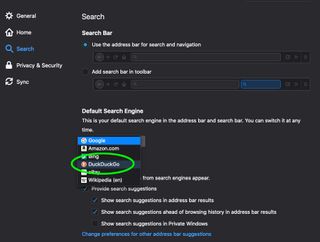
To make DuckDuckGo your homepage in Firefox, drag this link to the Home icon and select Yes in the pop-up window.
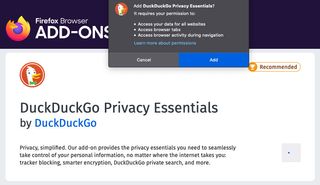
Like Chrome, Firefox has an add-on called DuckDuckGo Privacy Essentials that has extra privacy features.
Adding DuckDuckGo to other browsers
Safari users can simply tap the magnifying glass in the search bar, which will bring up a drop-down to select the default search engine. You can also add the DuckDuckGo extension from the App Store.

With Brave, open the hamburger menu at the top right and go to Settings > Search Engine. Open the dropdown menu at the top of the page and select DuckDuckGo as your default.
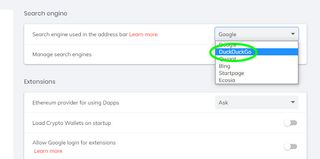
In Edge, click the three horizontal dots (they look like " … ") in the top right and select Settings. On the next page, click the three stacked lines in the top left and select > Privacy, Search and Services.
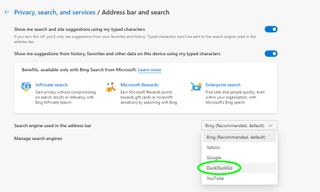
Scroll all the way down the page and, under the Services heading, click Address Bar and Search. Open the dropdown menu next to Search Engine Used in the Address Bar and select DuckDuckGo. You can also get the Privacy Essentials add-on .
Adding DuckDuckGo on mobile
DuckDuckGo has browsing apps for both iOS and Android . If you prefer to use DuckDuckGo as your default search engine within Safari, Firefox, or Brave, follow the steps on DuckDuckGo's help pages.
How to use DuckDuckGo
DuckDuckGo isn't all that different from any other search engine. Type your query into the search bar and get your results. As with Google, you can narrow your search to images, videos, news, maps and shopping.
DuckDuckGo's results pages look fairly similar to Google's, with knowledge panels, news carousels and related searches. However, you'll get more with Google search results, such as recent tweets, People Also Ask and videos, than you'll get with DuckDuckGo.

Google also returns different, and perhaps more relevant, results, depending on your perspective. When we searched for "Sundance Film Festival," Google's first four results (punctuated by People Also Ask and tweets from @SundanceFest) were from different pages on Sundance.org.

With DuckDuckGo, we got only one link, to the main festival page. The second result was from Wikipedia.

Microsoft's Bing splits the difference between the two, with results similar to DuckDuckGo but more robust knowledge panels.
It's also worth noting that DuckDuckGo uses Apple Maps (with pretty mediocre results) and Yelp reviews. Google obviously shows Google Maps and Google reviews. Bing runs on OpenStreetMap and TripAdvisor.

All that is to say, DuckDuckGo isn't anything special once you get beyond the privacy features. However, it can be a useful alternative if you're looking for a new search engine.

Anthony Spadafora is the security and networking editor at Tom’s Guide where he covers everything from data breaches and ransomware gangs to password managers and the best way to cover your whole home or business with Wi-Fi. Before joining the team, he wrote for ITProPortal while living in Korea and later for TechRadar Pro after moving back to the US. Based in Houston, Texas, when he’s not writing Anthony can be found tinkering with PCs and game consoles, managing cables and upgrading his smart home.
Google Maps is getting a big upgrade in time for your summer vacation
Google Search just got a big update — how you can control personal data appearing in search results
What is the Casper One mattress and should you buy it in Memorial Day sales?
admin said: DuckDuckGo is a famously privacy-conscious search engine. Here's how to set it up and use it. How to use DuckDuckGo: Everything you need to know : Read more
- bobc4012 This site needs to do a better job for posting comments. It keeps sending me to this comment for my own comment. This article is generally about you can have DuckGoas an add-on for some browsers. It does not discuss how to use DuckGo to do searching, At least I can find the various search techniques for Google, but not for DuckGo, which I was expecting to find in this article, instead of making it an add-on. Either rename the article or include how to various types of searching using DuckGo Reply
- View All 2 Comments
Most Popular
- 2 Do mattress toppers help with back pain or make it worse? Experts respond
- 3 After TikTok, DJI drone ban could be next for US lawmakers
- 4 Google Pixel 8a could get seven years of security updates — here's why
- 5 Should you buy a mattress from Amazon, Walmart or Costco? Pros and cons
- Skip to main content
DuckDuckGo Privacy Essentials for Safari: Tracker Blocking & Privacy Dashboard
Millions of Firefox and Chrome users rely on DuckDuckGo Privacy Essentials , our desktop browser extension that helps protect you no matter where you go on the web. Today, we're delighted to announce that the wait is over: DuckDuckGo Privacy Essentials is once again available for Safari users !
As you may be aware, major structural changes in Safari 12 meant that we had to remove DuckDuckGo Privacy Essentials from the Safari extensions gallery. With Safari 13, new functionality was thankfully added that enabled us to put it back. Consequently, you'll need Safari 13+ on macOS 10.15 (Catalina) or newer to install the updated version.
Tracker Blocking
At the heart of DuckDuckGo Privacy Essentials is our powerful tracker blocking technology, which automatically blocks hidden third-party trackers on the sites you visit, preventing the companies behind those trackers from collecting and selling your data. We've developed it to start protecting you immediately with no need for ongoing tweaking, although you're able to whitelist sites easily should you wish. Privacy, simplified.
Privacy Dashboard
While our tracker blocking technology works quietly in the background, there are times when you might want to see the effect it's having. The Privacy Dashboard takes the guesswork out of online privacy by showing you how we enhance each site's privacy, including showing a Privacy Grade. You'll quickly know how protected you are, even at a glance.
Private Search
While the extension doesn't include private search, DuckDuckGo Search is built into Safari as a default search option, and they work together to help you search and browse privately. Follow these simple steps below to set DuckDuckGo Search as your default search engine, and take advantage of the search improvements we recently announced :
- Open a new tab.
- Click the magnifying glass in the search bar.
- Select the option for DuckDuckGo.
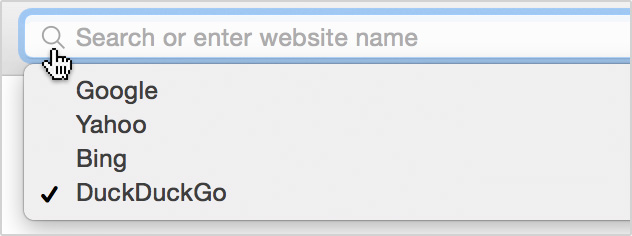
Is the new DuckDuckGo Privacy Essentials extension similar to the old Safari extension? While a lot of the functionality is the same, behind the scenes there have been big changes in making it compatible with the new extension structure that Safari now uses. Unfortunately, in this process we had to remove DuckDuckGo Smarter Encryption (our technology for enforcing secure website connections), but we are hopeful to restore this functionality to Safari as well soon. In the meantime, we also took the liberty to increase our tracker blocking coverage, and enhance the user interface for a better overall extension experience.
Does this work on mobile? DuckDuckGo Privacy Essentials is only available for desktop browsers. For mobile, we provide DuckDuckGo Privacy Browser for iOS and Android , which is a mobile app that uses the same technology to give you privacy protection wherever you go on the web.
Where can I get DuckDuckGo Privacy Essentials? Please visit duckduckgo.com/app , or for Safari you can go direct to apps.apple.com/app/duckduckgo-privacy-essentials/id1482920575
For more privacy advice follow us on Twitter , and stay protected and informed with our privacy newsletters .

DuckDuckGo Help Pages
About duckduckgo, how does duckduckgo protect my privacy, quick answer:.
If you’re like most people on the Internet, you use Google to search the web and Google Chrome to browse the web. That means by default Google can keep track of every single search you make and website you visit. On those websites, other companies may also track you.
DuckDuckGo is an independent Google alternative that also lets you search and browse the web, but we don’t track your searches or browsing history, and our browsers and extensions help you block other companies from trying to track you as well, all by default. Our free browser comes with seamless privacy protection built-in, including tracker blocking , increased encryption , email protection , and more, making it the most comprehensive privacy protection you can get with one download. Plus, subscribers to our Privacy Pro subscription service get three additional protections: a fast and simple VPN , a Personal Information Removal service, and an Identity Theft Restoration service. That’s how DuckDuckGo protects your privacy in a nutshell.
Detailed Answer:
Our product vision is to be the “easy button” for online privacy.
Our free web browser for Mac , Windows , iOS , and Android allows you to search and browse the internet just like Google search and Chrome, but comes packed with unique privacy protections working behind the scenes to protect and secure your personal data. These overlapping protections work together seamlessly to give you more peace of mind about privacy harms like companies getting your personal information without your consent, creepy ads following you around, and unsettling content targeting.
DuckDuckGo protects your privacy through a uniquely comprehensive set of privacy protections:
- Our private search engine doesn’t track you. That means unlike Google Search, we don’t save or share your search history, such that we have no way tie your searches or website visits to you personally and we don’t keep profiles of our users.
- Tracker blocking that goes above and beyond what’s available by default from other browsers like Chrome. For example, our 3rd-party Tracker Loading Protection blocks hidden trackers from companies like Google and Facebook lurking on other websites before they even get a chance to load. This works with our other tracking-preventing features like Cookie Protection , Link Tracking Protection , Referrer Tracking Protection , Fingerprinting Protection , CNAME Cloaking Protection , and Embedded Social Content Tracking Protection to help stop companies from watching what you do online and capturing personal data.
- Smarter Encryption to ensure that more of the websites you visit and links you click are securely encrypted, relative to other browsers.
- Cookie Pop-up Protection , which automatically selects the most private option from the cookie consent pop-ups it finds, and then hides them.
- The Fire Button , which allows you to easily burn recent on device browsing data in one click.
- Email Protection , which can hide your email address with unique @duck.com addresses when signing up for things online that forward to your existing email address, after removing email trackers.
- Duck Player, a YouTube player that limits invasive ads and keeps video views from impacting your YouTube recommendations.
- App Tracking Protection , currently available in our Android browser, that helps block 3rd-party trackers in your other apps, even when you’re not using them.
- Global Privacy Control (GPC) to help you express your opt-out rights automatically by telling websites (through a header and/or JavaScript-based signal) not to sell or share your personal information.
To be effective, our privacy protections need to continually evolve to mitigate how trackers attempt to evade specific protections. That’s why we offer multiple types of web tracking protections, continually improve them, and work to introduce new and innovative protections.
Note that our private search engine is also independently accessible at duckduckgo.com and as a built-in option in other popular browsers. However, if you just use the search engine, we cannot offer any privacy protection when you visit other web sites. To get that protection, you need our browser or browser extensions. Our help page on web tracking protections details which protections are available on which platforms.
In addition, our Privacy Pro subscription service includes three more protections:
- VPN : Secure your connection anytime, anywhere. Get full-device protection with the VPN built for speed, simplicity, and security. Available on Mac, Windows, iOS, and Android.
- Personal Information Removal : Find and remove your personal details – like your name and address – from sites that store and sell it, helping to combat identity theft and spam.
- Identity Theft Restoration : If your identity is stolen, a dedicated advisor will help you restore stolen accounts, recover financial losses, and correct your credit report. Brought to you by Iris (Iris Powered by Generali) — a world leader in identity theft restoration.
- a. Send us an email
- b. Anonymous form
- Buyer's Guide
- Upcoming Products
- Tips / Contact Us
- Podcast Instagram Facebook Twitter Mastodon YouTube Notifications RSS Newsletter
DuckDuckGo's Safari Privacy Browser Extension Now Available for macOS Catalina
Privacy oriented search engine DuckDuckGo today released an updated version of its browser extension for desktop Safari users running macOS Catalina.
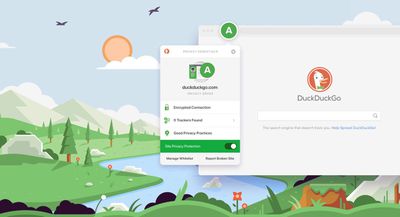
As you may be aware, major structural changes in Safari 12 meant that we had to remove DuckDuckGo Privacy Essentials from the Safari extensions gallery. With Safari 13, new functionality was thankfully added that enabled us to put it back. Consequently, you'll need Safari 13+ on macOS 10.15 (Catalina) or newer to install the updated version.
DuckDuckGo Privacy Essentials blocks hidden third-party trackers on websites and features a Privacy Dashboard, which generates a Privacy Grade rating (A-F) information card whenever a user visits a site. The rating aims to let them see at a glance how protected they are, while providing additional options to dig deeper into the details of blocked tracking attempts.
While the extension doesn't include private search, DuckDuckGo Search is built into Safari as a default search option, and they work together to help users search and browse privately.
DuckDuckGo Privacy Essentials is only available for desktop browsers, however DuckDuckGo Privacy Browser is available for iOS and uses the same privacy protection technology.
Get weekly top MacRumors stories in your inbox.
Top Rated Comments
Does the Safari browser extension and/or iOS app block ads, too?
DuckDuckGo is still quite a bit behind google when it comes to search results. I still use it as my primary engine, but sometimes have to switch to google...
So these extensions still work like this..?
Popular Stories
Apple Releases Open Source AI Models That Run On-Device

iOS 18 Rumored to Add These 10 New Features to Your iPhone

Apple Announces 'Let Loose' Event on May 7 Amid Rumors of New iPads

Apple Cuts Vision Pro Shipments as Demand Falls 'Sharply Beyond Expectations'

Apple Finally Plans to Release a Calculator App for iPad Later This Year

Best Buy Introduces Record Low Prices on Apple's M3 MacBook Pro for Members
Next article.

Our comprehensive guide highlighting every major new addition in iOS 17, plus how-tos that walk you through using the new features.

App Store changes for the EU, new emoji, Podcasts transcripts, and more.

Get the most out your iPhone 15 with our complete guide to all the new features.
A deep dive into new features in macOS Sonoma, big and small.

Revamped models with OLED displays, M3 chip, and redesigned Magic Keyboard accessory.

Updated 10.9-inch model and new 12.9-inch model, M2 chip expected.

Apple's annual Worldwide Developers Conference will kick off with a keynote on June 10.

Expected to see new AI-focused features and more. Preview coming at WWDC in June with public release in September.
Other Stories

23 hours ago by Tim Hardwick

2 days ago by Joe Rossignol

2 days ago by MacRumors Staff

3 days ago by Joe Rossignol

4 days ago by Tim Hardwick
- Services & Software
DuckDuckGo: What to Know About Google Search's Privacy-Focused Rival
Here's everything you should know about the privacy-minded search engine.

- Adam has been covering streaming services since 2013 and wants to help people navigate the subscription creep in their lives.
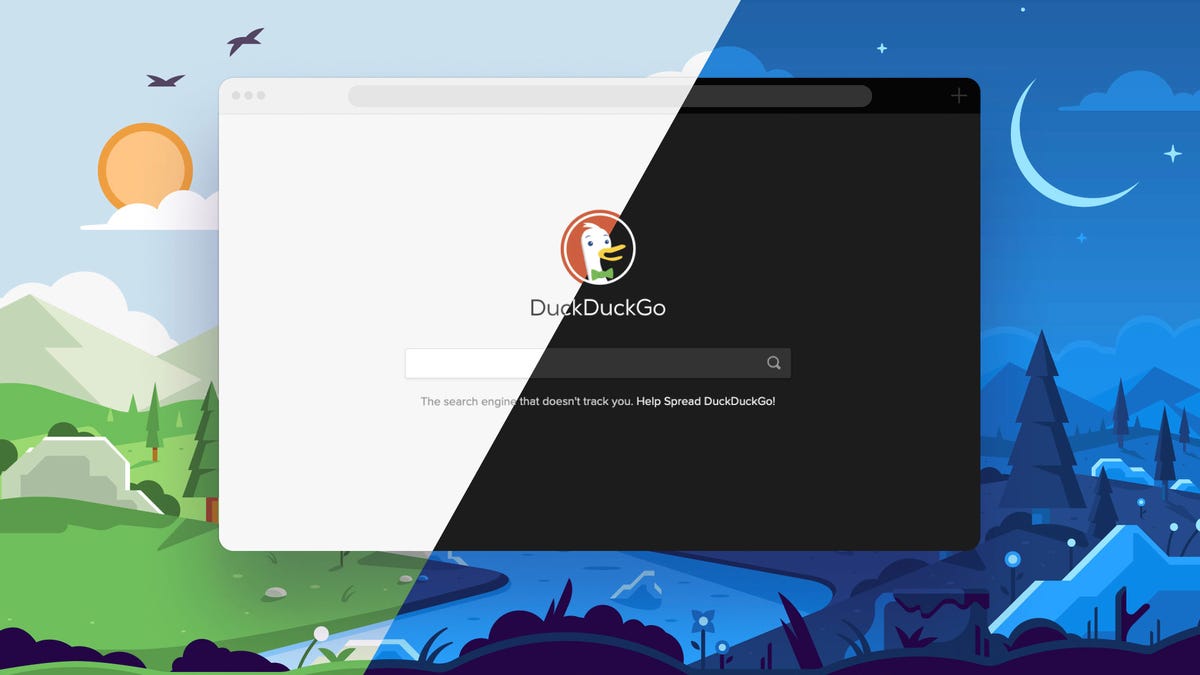
DuckDuckGo wants to put your digital privacy front and center.
Online trackers can be annoying. You search for a product or click an advertisement once, and then ads seem to follow you to the ends of the internet, even across devices. Sometimes, you just want a little privacy in your browsing. Enter DuckDuckGo, a browser and search engine that pledges to keep your search activity anonymous and not track you online.
There are other private browsers, such as Brave and the Mullvad Browser , that block other people from monitoring your online activity. But DuckDuckGo sees itself as a direct competitor to Google Search, complete with a mobile app and extensions for Chrome, Firefox, Safari and other browsers, as well as for Windows and Mac browsers in public beta .
After major incidents like the Cambridge Analytica scandal , people have become more aware of how much personal information is available to tech companies and advertisers -- and are opting out of being tracked when they can. While it doesn't track users, DuckDuckGo's app was downloaded more than 50 million times between July 2020 and June 2021 -- more than all other years combined since its 2008 launch.
Here's what you need to know about DuckDuckGo and how it tries to keep your searches more secure.
What is DuckDuckGo?
DuckDuckGo is a search engine that's available as both a mobile browser app and a desktop extension, each aimed at allowing you to browse the internet without companies gobbling up your personal data. It promises to keep your searches private, anonymous and offers built-in tracker blocking, so the sites you visit have a harder time collecting information about you.
Read more: Best VPNs of 2023
How does DuckDuckGo work?
For starters, DuckDuckGo does not track searches made through its browser extension or mobile app. Other browsers, including Chrome, allow you to use private or incognito windows that don't track your search history, but their default windows do. (That's the basis of every " embarrassing search history " joke.) Instead of making you navigate to a different version of its app, DuckDuckGo never tracks your search history.
Searches made through DuckDuckGo also automatically connect you to the encrypted versions of websites wherever possible, making it harder for anyone else to see what you're looking at online. This is another scenario where both options (encrypted and unencrypted) exist on other search engines, but the default isn't always the privacy-friendly option. DuckDuckGo saves you the extra steps of manually navigating to encrypted connections.
DuckDuckGo was criticized in May 2022 when researchers discovered some Microsoft tracking scripts while using DuckDuckGo's browsers. The presence of Microsoft trackers seemed to fly in the face of the search engine's privacy promise, and DuckDuckGo's founder and CEO clarified on Reddit that the company was "currently contractually restricted by Microsoft" from stopping Microsoft scripts from completely loading. This is because the company uses Microsoft's Bing to power its search results. The company followed up in August, however, by announcing that it would further restrict Microsoft trackers in its browsers .
However, DuckDuckGo remains ahead of other popular privacy options when it comes to blocking tracking data, and the company has clarified its app store descriptions to better clarify limitations in its privacy protections. DuckDuckGo had also previously disclosed its partnership with Microsoft , and its CEO said in the Reddit post that the company is working to get that restriction changed.
DuckDuckGo also actively blocks external trackers from following you around online. For a more detailed explanation of DuckDuckGo's privacy features, check out DuckDuckGo's blog .
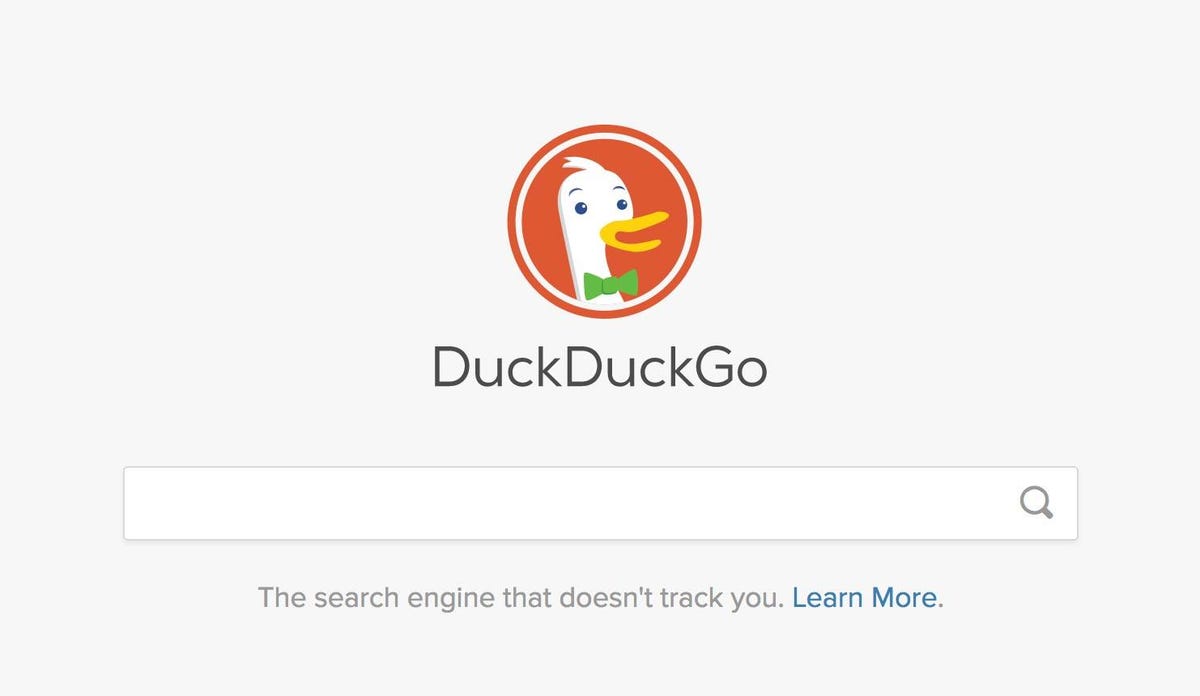
The DuckDuckGo search engine emphasizes privacy.
How is DuckDuckGo different from Google Search? What about Incognito mode and private browsing?
DuckDuckGo essentially takes the opposite approach compared to other big tech companies like Google and Facebook, which have traditionally made money by targeting ads based on your browsing history and personal data. While Google has said it's going to stop this practice , the platform still collects a ton of data about you, including your location and search activity -- yes, even in incognito mode.
Incognito mode simply deletes information related to your browsing session from your computer: your history, cookies and any info you've entered into fields. Notably, it only does that after you end your session by closing out all your tabs. So if you leave your incognito tabs open for hours or days at a time, that information will still build up. And no matter what, Google can save your searches -- and companies, internet service providers and governments can still track you across the internet, even when you're using incognito mode.
DuckDuckGo is different because it doesn't store your browsing data at all, and it blocks trackers while you're browsing.
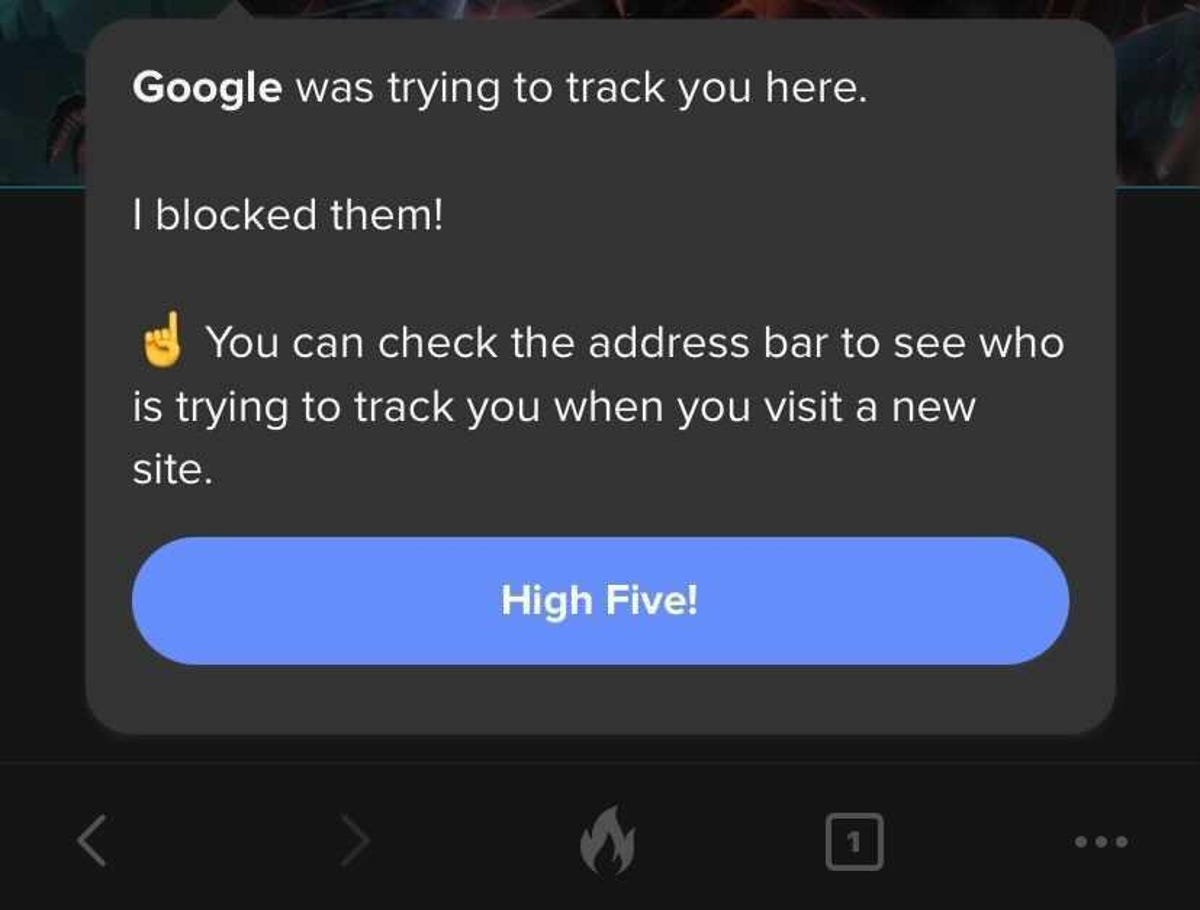
When you first use the DuckDuckGo Privacy Browser, the app will walk you through the different ways it protects your privacy.
If it isn't targeting ads, how does DuckDuckGo make money?
DuckDuckGo still makes money from advertising -- it just doesn't use targeted ads. The search engine shows you ads based on the keywords you search for, which aren't connected to your personal data like your browsing or purchase history. Essentially, you'll only see ads for whatever you're currently searching for, not the weird product your friend sent you a link to last week that you now can't get away from.
How can I use DuckDuckGo?
On mobile devices, simply open your app store and search for "DuckDuckGo." You'll be able to download the DuckDuckGo Privacy Browser app and use it the same way you'd use Chrome or Safari. At the bottom center of your app, you'll see a fire icon, which you can press at any time to close all your tabs and clear all personal data.
On desktop, go to duckduckgo.com , where you'll see a button to add DuckDuckGo to your browser. On Chrome, you'll be directed to the Chrome webstore page to download the extension for free. On Safari, you'll be instructed on how to set DuckDuckGo as your default search engine or to manually activate a search using DuckDuckGo.
For more about online privacy, check out the five reasons to ditch Google for DuckDuckGo , what to know about DuckDuckGo's free AI feature DuckAssist and how DuckDuckGo's app tracking protection beta is available to Android users.
Services and Software Guides
- Best iPhone VPN
- Best Free VPN
- Best Android VPN
- Best Mac VPN
- Best Mobile VPN
- Best VPN for Firestick
- Best VPN for Windows
- Fastest VPN
- Best Cheap VPN
- Best Password Manager
- Best Antivirus
- Best Identity Theft Protection
- Best LastPass Alternative
- Best Live TV Streaming Service
- Best Streaming Service
- Best Free TV Streaming Service
- Best Music Streaming Services
- Best Web Hosting
- Best Minecraft Server Hosting
- Best Website Builder
- Best Dating Sites
- Best Language Learning Apps
- Best Weather App
- Best Stargazing Apps
- Best Cloud Storage
- Best Resume Writing Services
- New Coverage on Operating Systems
- Hostinger Coupon Codes
- HR&R Block Coupons
- ShutterStock Coupon Codes
- FedEx Office Coupons
- Coursera Coupons
- Autodesk Coupons
- Codeacademy Coupon Codes
- iolo Techologies Coupons
- Norton Coupon Codes
- Generative AI
- Office Suites
- Collaboration Software
- Productivity Software
- Augmented Reality
- Emerging Technology
- Remote Work
- Artificial Intelligence
- Operating Systems
- IT Leadership
- IT Management
- IT Operations
- Cloud Computing
- Computers and Peripherals
- Data Center
- Enterprise Applications
- Vendors and Providers
- Enterprise Buyer’s Guides
- United States
- Netherlands
- United Kingdom
- New Zealand
- Newsletters
- Foundry Careers
- Terms of Service
- Privacy Policy
- Cookie Policy
- Copyright Notice
- Member Preferences
- About AdChoices
- E-commerce Affiliate Relationships
- Your California Privacy Rights

Our Network
- Network World

How and why Apple users should switch to DuckDuckGo for search
Apple users who care about privacy are moving to duckduckgo for search. these tips will get you started with it..

Like liberty for all, privacy demands vigilance, and that’s why Apple users who care about those things are moving to DuckDuckGo for search.
Why use DuckDuckGo?
Privacy is under attack.
It doesn’t take much effort to prove this truth. At time of writing, recent news is full of creeping privacy erosion:
- We’ve seen video conferencing solutions that surreptitiously install software on your Macs .
- A face-changing photography app perhaps implicated in the assembly of a vast database of faces .
- A household name in smart speakers has shared private conversations with people you don’t know, including chatter you didn’t know was recorded in the first place.
And then there’s Duck Duck Go.
With Duck Duck Go, you are the searcher, not the searched
I think most Apple users know about DuckDuckGo. It is an independent search engine designed from the ground up to maintain your privacy .
It means the search service doesn’t collect information about you, doesn’t gather your search queries, and doesn’t install cookies or tracking code on your systems.
It now also provides highly accurate maps thanks to a deal with Apple that lets it use the also private-by-design Apple Maps service. To do this, the search engine is using Apple’s MapKit JS framework, which Apple created so website owners could embed maps in their sites.
Maps on DuckDuckGo are quite satisfying and will only improve as Apple introduces more detailed maps, better local business listings, and additional feature. You should see this service in action here .
How Apple Maps works on DuckDuckGo
DuckDuckGo added Apple Maps support at the beginning of 2019.
Since then, it has introduced a set of compelling improvements to how it works, thanks to Apple’s framework. You now get better implementation of Maps in your search, including the benefit of local search results. Additional enhancements include:
- Map re-querying : You can now refine search queries within the expanded maps view. You can also zoom in and out or move around the map to find other results that match your search.
- Local autocomplete : You will be provided with search suggestions as you type based on the local region visible on your map. Type fuel in a map of the Arizona desert, and you can see how many miles you’ll need to walk if your fuel runs out.
- Dedicated Maps tag : Look at the top of a search result, and you’ll find a Maps tab, which joins the images, videos, news, and meanings tabs.
There’s even a Dark Mode that is enabled when you switch to DuckDuckGo’s dark theme – when you switch, you’ll see the embedded Apple Maps also do so.
(Switch to dark theme in the search engine’s Settings, which you’ll find here . You can also discover much more information on how the search engine protects your privacy, primarily by not collecting it in the first place.)
How do they ensure your privacy when running map and address-related searches? DuckDuck Go explains :
“With Apple, as with all other third parties we work with, we do not share any personally identifiable information such as IP address. And for local searches in particular, where your approximate location information is sent by your browser to us, we discard it immediately after use.”
How to set DuckDuckGo as default search on Apple devices
There are two ways to use DuckDuckGo rather than Google for search:
1. You can visit the DuckDuckGo.com website and use search in your browser there.
2. You can also change your Mac, iPhone or iPad’s default search service in order to use the far more private alternative. I think most readers know about this, but just in case:
- On a Mac: Safari Preferences>choose the Search tab and choose DuckDuckGo in the drop down list of search engine choices.
- On iOS/iPad OS: Settings>Safari and select DuckDuckGo from the options provided in the Search Engine section. You need to do this for all your devices individually.
Once you change your default search engine, all the searches you make in the future will be made using the more private service. You may even want to switch to using MeWe as a social network to replace Facebook while you’re at it.
Up next…
“We believe there should be no trade-off for people wanting to protect their personal data while searching,” the search engine explains. “Working with Apple Maps to enhance DuckDuckGo Search is an example of how we do this and pushes us further in our vision of setting a new standard of trust online.”
This is all well and good, but how do they see this experience extending itself in future?
I am not currently in possession of a working crystal ball, but here are two realistic and possible ways the service could be extended:
- Imagine how cool this would be with the addition of Apple’s delightfully lag-free Look Around Street View-killer.
- Imagine how embedded AR experiences could also become part of what’s on offer through the search service.
Why not? We know Apple takes this stuff seriously . It is surely only a matter of time until it declines Google for search .
Like liberty for all, privacy demands vigilance. Be vigilant.
Please follow me on Twitter , or join me in the AppleHolic’s bar & grill and Apple Discussions groups on MeWe.
Related content
How to fix icloud sync in seconds, chasing business and partnerships, apple goes apac, apple wants to improve the carbon offset market, apple sidles into sideloading in the eu, from our editors straight to your inbox.

Hello, and thanks for dropping in. I'm pleased to meet you. I'm Jonny Evans, and I've been writing (mainly about Apple) since 1999. These days I write my daily AppleHolic blog at Computerworld.com, where I explore Apple's growing identity in the enterprise. You can also keep up with my work at AppleMust , and follow me on Mastodon , LinkedIn and (maybe) Twitter .
Show me more
Windows 11 insider previews: what’s in the latest build.

Dropbox adds end-to-end encryption for team folders

Android versions: A living history from 1.0 to 15

After 10 years of progress, does mixed reality (XR) have a future? | Ep. 147

More tech layoffs as AI takes hold | Ep. 146

Why the world will be wearing more technology in the future

After 10 years of progress, does mixed reality (XR) have a future?

More tech layoffs as AI takes hold

DuckDuckGo Privacy for Safari 4+
Privacy, simplified., duckduckgo, inc..
- 4.3 • 18 Ratings
Screenshots
Description.
Tired of being tracked online? We can help. DuckDuckGo Privacy Essentials comes packed with best-in-class privacy essentials and makes browsing Safari even faster. Block Tracking Cookies — prevent most 3rd-party cookies from tracking you as you browse from site to site. Escape Website Trackers Before They Load - we automatically stop most hidden trackers (3rd-party scripts) from loading, which prevents companies from collecting and using any personal data from these trackers. Our cutting-edge tracker blocking technology – called 3rd-Party Tracker Loading Protection – goes above and beyond what you get in most popular browsers by default. After you install our extension, you’ll be asked to enable Tracker Blocking and the Privacy Dashboard within Safari. While the extension doesn’t include DuckDuckGo Private Search, it is built into Safari as a default search option. Enabling all three gives you seamless privacy protection. Privacy, simplified. Note about our 3rd-Party Tracker Loading Protection following DuckDuckGo ad clicks: Our 3rd-Party Tracker Protection goes above and beyond what you get in most popular browsers by default, but we’re constantly working to make it more comprehensive. Currently, if an advertiser wants to detect conversions on their own website for our private DuckDuckGo search ads, our 3rd-Party Tracker Loading Protection will not stop bat.bing.com requests from loading on the advertiser’s website following DuckDuckGo ad clicks, but those requests are stopped in all other contexts. This is because DuckDuckGo private search advertising is in partnership with Microsoft. As part of that partnership, viewing ads on DuckDuckGo is anonymous and Microsoft has committed to not profile our users’ ad clicks. Read more about this and our Tracking Protections at https://help.duckduckgo.com/privacy/web-tracking-protections/ You don't need to wait to take back your privacy. Join the millions of people using DuckDuckGo and protect many of your everyday online activities with one app. It's privacy, simplified. More About DuckDuckGo • About Us: https://duckduckgo.com/about/ • Privacy Newsletter: https://duckduckgo.com/newsletter • Privacy Policy: https://duckduckgo.com/privacy/ • Open Source Code: https://github.com/duckduckgo/duckduckgo-privacy-extension
Version 1.8.0
Bug fixes and improvements.
Ratings and Reviews
Does what it says.
Great and solid safari extension, Blocks most ads! And I just love the duck picture, so much more fun compared to google! My only complaint is the search results the engine yields arent as good as google's, but I guess good search VS privacy...
Doesnt block most trackers such as Facebook
In private browser mode in Safar the extension works sometimes, however, in normal browser mode it lets most nearly all tarckers and cookies through. The 'DuckDuckGo Privacy Essentials' is actually a bundle containing 'Privacy Dashbord' and 'Privacy Protection' (the actual tracker blocker). The 'Privacy Protection' extension is good and cant access your website data or passwords, and does its job of blocking trackers. The catch is with the bundle 'Privacy Dashboard' is an enforced extension included and can do the following "Can read sensitive information from webpages including passwords, phone numbers and credit cards on * all webpages" and "Browsing History: Can see when you visit * all webpages". It is impossible just to keep the 'Privacy Protection' extension only. If you delete the 'Privacy Dashboard' you must remove the 'DuckDuckGo Privacy Essentials' from Applications which then also removes the 'Privacy protection' extension. This is a most egregious breach of privacy from a so called privacy focused company. It is also a shame that Apple lets DuckDuckGo bundle the extension/s like this. DuckDuckGo please review your deceptive and security/ privacy invading mistake and enable the extension 'Privacy Protection' (the tracker blocker) to be downloaded by itself without 'Privacy Dashboard'.
Developer Response ,
Hi. We've found that trackers have become more sophisticated to evade blockers, so our extension needs access within pages to block them, hence the permissions. Please be reassured that we still adhere to our privacy policy, which is that we don't collect or share personal information. More here: https://duckduckgo.com/privacy However, if you'd still prefer to, you can certainly disable the Privacy Dashboard and keep the Privacy Protection enabled. This can be done within your Safari Preferences window.
Excellent Hate ....ads read on.
Just add Wipr Then add the three blockers And you are good to go I check Wipr evey day Add some beer mone It all helps preserve cash for food.
App Privacy
The developer, DuckDuckGo, Inc. , indicated that the app’s privacy practices may include handling of data as described below. For more information, see the developer's privacy policy .
Data Not Linked to You
The following data may be collected but it is not linked to your identity:
- Diagnostics
Privacy practices may vary, for example, based on the features you use or your age. Learn More
Information
- Developer Website
- App Support
- Privacy Policy
More By This Developer
DuckDuckGo Private Browser
- Mobile Site
- Staff Directory
- Advertise with Ars
Filter by topic
- Biz & IT
- Gaming & Culture
Front page layout
Search shuffle —
Apple considered ditching google for duckduckgo in safari’s private mode, but apple exec argued duckduckgo wasn't as private as believed..
Samuel Axon - Oct 5, 2023 9:17 pm UTC

In iOS 17 , Apple recently made it easier to use alternatives to Google search in the Safari web browser's private browsing mode—but the company considered going even further by making DuckDuckGo, which is marketed as a more private alternative, the default choice in that context.
As reported by Bloomberg's Leah Nylen, the information came to light when Amit Mehta, the US District Judge who is handling the US antitrust trial over Google search, unsealed transcripts of testimonies by DuckDuckGo CEO Gabriel Weinberg and Apple SVP of machine learning and AI strategy John Giannandrea. Giannandrea worked as Google's head of search before his current role at Apple .
Further Reading
Giannandrea had a different take, though. He was heavily involved in Apple's discussions about its future with search, and he dismissed a switch to DuckDuckGo, partly because he felt that DuckDuckGo's "marketing about privacy is somewhat incongruent with the details" because DuckDuckGo relies on Bing in some areas. He said he would have wanted to do "a lot more due diligence with DuckDuckGo" should the switch have happened. He previously argued against switching to DuckDuckGo in an internal company email.
These conversations happened in the wider context of the antitrust trial over Google search, which, by some estimates, accounts for 90 percent of the market. Apple famously has a highly lucrative deal with Google to use the latter's search engine as the default option in Safari, which is the default web browser on iPads, Macs, and, most importantly, iPhones.
Previous trial testimonies revealed that Apple and Microsoft considered a wide-ranging partnership or even acquisition that would lead to Microsoft-developed search engine Bing becoming the default for Apple devices. Apple reportedly believed at another point that the only viable alternative to Google would be to develop its own search engine—which it didn't, perhaps because the Google deal was so lucrative.
Judge Mehta is looking closely at Google's deal with Apple as the trial weighs whether the search giant's dominance is anti-competitive in the US.
For DuckDuckGo's part, a company spokesperson was quoted in Bloomberg saying that the search engine takes measures to prevent "hosting and content providers from creating a history of your searches," in contrast to Giannandrea's statement that DuckDuckGo wasn't as comprehensively private as it claimed.
reader comments
Channel ars technica.
Navigation Menu
Search code, repositories, users, issues, pull requests..., provide feedback.
We read every piece of feedback, and take your input very seriously.
Saved searches
Use saved searches to filter your results more quickly.
To see all available qualifiers, see our documentation .
- Notifications
DuckDuckGo Privacy for Safari
duckduckgo/privacy-for-safari
Folders and files, repository files navigation.
Requires Xcode 11 and macOS 10.15 or better.
Open the project in Xcode then build and run the DuckDuckGo scheme.
We use SwiftLint for enforcing Swift style and conventions, so you'll need to install it .
We use Proxima Nova fonts which are proprietary and cannot be committed to source control, see fonts .
Cleaning up
CAUTION - this is a destructive process. Please be comfortable with the contents of deleteApp.sh before running it.
To competely remove the app and any files it creates:
- Disable the extension in Safari's Extension Preferences pane.
- Run the ./deleteApp.sh script.
Please refer to contributing .
Contact us at https://duckduckgo.com/feedback if you have feedback, questions or want to chat. You can also use the feedback form embedded within the macOS app - to do so open the app and select "Send Feedback".
DuckDuckGo Privacy for Safari is distributed under the Apache 2.0 license .
Contributors 10
- Swift 98.1%
Your Guide to Private Browsing in Safari
Private browsing is often misunderstood, but it can be a helpful feature if you know what’s what.
Quick Links
What private browsing does in safari, how to use safari private browsing on iphone and ipad, how to use safari private browsing on a mac, how to disable safari private browsing on iphone and ipad, how to disable safari private browsing on a mac, key takeaways.
- Private Browsing in Safari hides browsing history, autofill details, downloads, and locks tabs after inactivity.
- Safari on Mac groups private and non-private tabs, while on iPhone it shows all tabs regardless of mode.
- To use Private Browsing in Safari, identify it by a dark address bar, "Private" indicator, or "Private" next to the site URL.
Most browsers offer a private browsing mode that aims to keep the websites you view off the record. But what exactly does it do in Safari and how do you get the best out of it?
First and foremost, Private Browsing keeps the website pages you visit out of your History . The aim is to prevent someone else from seeing which pages you have visited if they have access to your phone or computer.
In Safari, Private Browsing does a lot more than just hide URLs. It also:
- Prevents recent searches from showing up in your history.
- Stops remembering details you enter in forms for autofill.
- Keeps downloaded items from appearing in your Downloads list.
- Locks private tabs after a period of inactivity.
- Adds tracking and fingerprinting protection.
However, it’s important to note that Private Browsing does not stop you from being tracked altogether. Websites you visit will still be able to use various methods to track you, and will still have access to all data that you send them.
On macOS, iOS, and iPadOS, Safari groups private tabs together, and separates them from non-private tabs. On Mac, each Safari window is either private or non-private, and can have as many tabs as you want.
On iPhone, you can switch between private and non-private modes, each of which shows all tabs belonging to that mode.
You can spot when you’re viewing a private tab with these signs:
- The address bar has a dark background. This may be less noticeable if you’re using Dark Mode .
- On Mac, you’ll see a prominent Private indicator in the title bar.
- On iPhone, you’ll see Private alongside the site URL at the bottom of your screen.
The steps to enter Private Browsing mode are nearly identical on an iPhone and iPad. The only difference is that the tab icon is at the bottom of the screen on iOS and the top on iPadOS.
- Long-press the tab icon (two overlapping pages) on the bottom-right (iPhone) or top-right (iPad) of your screen.
- Tap the New Private Tab menu item.
- If locked, enter your passcode to unlock Private Browsing.
You can enter Private Browsing mode on macOS using either a menu item or a keyboard shortcut:
- Open the File menu and choose New Private Window .
- Alternatively, use the keyboard shortcut Shift + Cmd + n .
- Use the browser as you normally would. Any tabs you open from this window will open in the same window, in private mode.
You may want to prevent users of an iPhone or iPad from using Private Browsing mode at all. To do so:
- Open the Settings app.
- Tap on Screen Time .
- Under RESTRICTIONS , click on Content & Privacy Restrictions .
- If not already enabled, press the toggle next to Content & Privacy Restrictions to enable.
- Tap Content Restrictions .
- Change the Web Content setting to Limit Adult Websites .
The option to enter private mode will now be gone.
On macOS, the wording of certain options differs slightly, but the overall process is near-identical to iOS:
- Open System Settings via the Apple menu.
- Click on Screen Time in the left panel.
- Under the Restrictions section, click on Content & Privacy .
- Click Content Restrictions .
- Change the Access to Web Content setting to Limit Adult Websites .
Private Browsing will now be unavailable in Safari, although any existing private windows will stay open.
Of course, anyone can re-enable Private Browsing using the same process, in reverse. However, you can use Screen Time’s Lock Screen Time Settings option to set a passcode and enforce the setting permanently.

DuckDuckGo VPN: A User-Friendly Privacy Boost, but Not for Power Users
DuckDuckGo is a privacy-focused search engine. Unlike rivals such as Google and Bing, DuckDuckGo eschews ad trackers, making it tougher for websites to gather browsing data. In addition to its search engine, the company offers a web browser and mobile apps. When DuckDuckGo announced its Privacy Pro suite -- consisting of a VPN, information removal tool and identity theft restoration -- I was excited to give its virtual private network a spin.
During my testing, I was impressed by DuckDuckGo’s VPN offering. Although it lacks the sheer volume of servers and bountiful features of our top VPN recommendations , like ExpressVPN or NordVPN, its intuitive design is great for beginners.
DuckDuckGo’s Privacy Pro VPN is user-friendly
DuckDuckGo’s Privacy Pro VPN is impressively simple without sacrificing basic functionality. Everything from signing up to using the VPN itself is a breeze. Here’s how to get started with DuckDuckGo’s VPN:
1 . Head over to DuckDuckGo and click on the Privacy Pro link.
2 . Select the $10 a month or $100 a year plan to sign up, or choose I Have a Subscription if you’re already enrolled.
3 . Now that you’re signed up, download and install the DuckDuckGo browser or fire it up on your device if it’s already on your machine.
4 . To log into your DuckDuckGo VPN, you’ll need to enter a one-time passphrase , which will be emailed to you.
Once you’ve signed into your Privacy Pro account, you’ll need to enable your VPN.
To turn on a VPN on Android or iOS/iPadOS:
1 . Tap Open VPN in your DuckDuckGo app.
2 . Then, you can toggle on your virtual private network.
Here’s how to add DuckDuckGo on Windows and MacOS:
1. Head to Settings > Privacy Pro > VPN .
2 . Confirm the pop-up asking you to install the DuckDuckGo VPN. On Windows, tap Install . With MacOS, press. Add VPN Configuration and Allow in the pop-up window.
3 . Click the VPN logo in the top right-hand corner of your DuckDuckGo browser.
Privacy Pro is great for general privacy and streaming
Compared to other VPNs, like ExpressVPN , NordVPN and Surfshark , DuckDuckGo is pretty spartan. You can choose from servers in seven different countries: Canada, France, Germany, the Netherlands, Spain, the UK and US. Split tunneling -- which lets you use a VPN for some apps but not others -- is available on Android, but not MacOS, Windows or iOS/iPadOS.
I regularly use split tunneling when I want to stream one of my favorite Canadian TV shows, Murdoch Mysteries, on the CBC website using a VPN while excluding my Steam client so I can download PC games without throttling my internet connection .
I didn’t experience any DNS leaks, and was thrilled to discover built-in kill switch functionality. A kill switch disables your internet connection in the event of an unexpected VPN interruption, ensuring that your actual IP address stays masked. In addition to enhancing privacy, DuckDuckGo’s VPN is decent for streaming . I was able to use the Privacy Pro VPN to watch Final Destination on Netflix using a French server -- normally, it’s unavailable on Netflix in the US.
But you won’t find the vast array of settings that well-established VPN providers offer. For instance, you can’t select different VPN protocols like OpenVPN or IKEv2 -- DuckDuckGo only uses WireGuard. VPN newcomers shouldn’t mind, but power users may be disappointed by the lack of customization. Likewise, DuckDuckGo’s server roster of seven countries currently falls well short of the 100-plus worldwide locations that CNET’s top VPNs include. Its relatively small server network means DuckDuckGo isn’t ideal for travel .
You won’t find specialty servers, such as Double VPN or Onion Over VPN options, which encrypt your connection twice for beefed-up privacy. Similarly, DuckDuckGo’s virtual private network doesn’t include obfuscated servers , which make it more difficult for ISPs or websites to determine that you’re using a VPN -- helpful in situations like on school Wi-Fi where VPNs might not work properly with some apps. Folks with critical privacy needs, like investigative journalists or political asylum-seekers, should look elsewhere.
However, there’s beauty in its simplicity. People simply seeking extra privacy while browsing the web or the ability to unblock international Netflix libraries in a handful of countries will appreciate the no-frills design of DuckDuckGo’s VPN. And the service should only improve. A DuckDuckGo spokesperson told me via email that the company plans to bring split tunneling to other operating systems besides just Android and that there’s a third-party audit in progress to back up its no-log claims. Plus, DuckDuckGo intends to roll out more servers as its Privacy Pro service gains traction.
Unlike other browser plugins, the DuckDuckGo VPN works machine-wide
Whereas most VPN browser plugins only tunnel your web browser traffic through a virtual server, DuckDuckGo’s Privacy Pro VPN works across your entire device. Essentially, the DuckDuckGo browser doubles as a VPN client app. So with the DuckDuckGo VPN toggled on, I was able to stream Law & Order: Special Victims Unit (normally on Peacock and Hulu in the US) on Netflix via a UK server in the Windows Netflix app. By comparison, most Chrome VPN plugins like the NordVPN app only secure traffic in your browser, not apps downloaded on your device or other web browsers.
Privacy Pro is a nice way to support DuckDuckGo and easily bolster privacy on supported devices
Because of its limitations, I don’t think DuckDuckGo’s Privacy Pro VPN will become most folks’ -- myself included -- daily driver. It’s only supported on a handful of platforms, has a small server network and lacks many advanced features. Still, it’s a great choice for DuckDuckGo enthusiasts who want to financially support the privacy-centric search engine and keep it free from data collection. Developing a browser and search engine isn’t free, so this is a neat means of getting a solid service while contributing to DuckDuckGo development efforts.
Additionally, I can see this as a nifty all-in-one privacy suite -- a VPN and tracking-free browser -- while on a borrowed computer. You could simply download the DuckDuckGo browser , log into your VPN and enjoy system-wide privacy on a friend or family member’s PC, for example. That saves you from having to download a VPN app, install it and log in. Plus you get the added benefit of browsing without saved search history that way.
VPN beginners who just want more privacy will appreciate the streamlined interface. If you don’t care about the small pool of servers or limited features, this is a good choice. VPNs can be overwhelming if you’ve never used one, and this app lets you get started without needing a veritable glossary of terms to determine the correct settings to enable.
While I mostly stuck to the VPN portion, Privacy Pro includes a Personal Information Removal feature alongside Identity Theft Restoration. Personal Information Removal lets you remove information, such as your home address and phone number, from sources like people-finder websites. Data deletion services like this are useful, if imperfect, ways to get your information away from data brokers. Identity Theft Protection assists in the event of identity theft -- a service I wish I had a few years ago when my credit card was charged over $800 at a barber shop (spoiler alert: It wasn’t me). If you’re in the market for these services, paying $10 a month or $100 annually is a great value. and on top of that, you get a VPN.
For more information about this privacy-focused search engine, learn why you should use DuckDuckGo instead of Google .
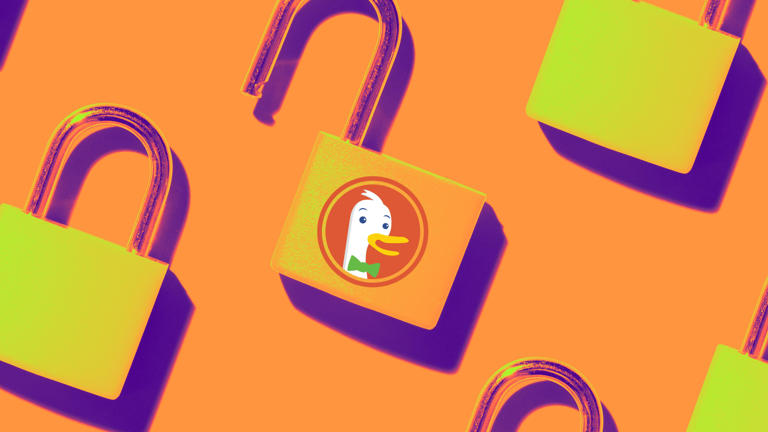

IMAGES
VIDEO
COMMENTS
To get that protection, you need to use our extension or browser. Our free web browser is available for Mac, Windows, iOS, and Android . It comes with seamless privacy protection built-in, including private search, tracker blocking, increased encryption, email protection, and more. Prior versions on GitHub . The DuckDuckGo extension offers ...
Currently, if an advertiser wants to detect conversions on their own website for our private DuckDuckGo search ads, our 3rd-Party Tracker Loading Protection will not stop bat.bing.com requests from loading on the advertiser's website following DuckDuckGo ad clicks, but those requests are stopped in all other contexts.
I'm going to show you how to install and use this free Safari extension so you can extend the privacy of Safari. All you'll need is an Apple laptop or desktop and the Safari browser.
Apple Safari. On a Mac, launch Safari, click "Safari" in the menu bar at the top of the screen, then click "Preferences." You can also use the Command+, shortcut to quickly bring up Safari's Preferences. Click on the Search tab, then choose DuckDuckGo under the "Search engine" drop-down box. In Safari for iPhone and iPad, launch the Settings ...
With Brave, open the hamburger menu at the top right and go to Settings > Search Engine. Open the dropdown menu at the top of the page and select DuckDuckGo as your default. The setting to make ...
DuckDuckGo is an independent Internet privacy company that aims to make getting privacy simple and accessible for everyone. Our free web browser for iOS, Android, Mac, and Windows lets you search and browse the web, but — unlike Google Search and Chrome — we don't track your searches or browsing history, and we block other companies from ...
For more privacy advice follow us on Twitter, and stay protected and informed with our privacy newsletters.. Dax the duck. We're the Internet privacy company for everyone who's had enough of hidden online tracking and wants to take back their privacy now.
DuckDuckGo is an independent Google alternative that also lets you search and browse the web, but we don't track your searches or browsing history, and our browsers and extensions help you block other companies from trying to track you as well, all by default. Our free browser comes with seamless privacy protection built-in, including tracker ...
While the extension doesn't include private search, DuckDuckGo Search is built into Safari as a default search option, and they work together to help users search and browse privately.
On Safari, you'll be instructed on how to set DuckDuckGo as your default search engine or to manually activate a search using DuckDuckGo. For more about online privacy, check out the five reasons ...
On a Mac: Safari Preferences>choose the Search tab and choose DuckDuckGo in the drop down list of search engine choices. On iOS/iPad OS: Settings>Safari and select DuckDuckGo from the options ...
When comparing DuckDuckGo vs Safari, the Slant community recommends Safari for most people. In the question "What are the best internet search engines?" Safari is ranked 1st while DuckDuckGo is ranked 5th ... It is reasonable for DDG users to assume and expect a private search engine warns if there is a risk to that privacy being lost, like it ...
Does what it says! Great and solid safari extension, Blocks most ads! And I just love the duck picture, so much more fun compared to google! My only complaint is the search results the engine yields arent as good as google's, but I guess good search VS privacy...
When you visit a website, it's likely that first-party and third-party trackers are active in the background, monitoring and profiling your behavior.
In iOS 17, Apple recently made it easier to use alternatives to Google search in the Safari web browser's private browsing mode—but the company considered going even further by making DuckDuckGo ...
CAUTION - this is a destructive process. Please be comfortable with the contents of deleteApp.sh before running it. To competely remove the app and any files it creates: Disable the extension in Safari's Extension Preferences pane. Run the ./deleteApp.sh script.
Private Browsing in Safari hides browsing history, autofill details, downloads, and locks tabs after inactivity. Safari on Mac groups private and non-private tabs, while on iPhone it shows all tabs regardless of mode. To use Private Browsing in Safari, identify it by a dark address bar, "Private" indicator, or "Private" next to the site URL.
DuckDuckGo is a privacy-focused search engine. Unlike rivals such as Google and Bing, DuckDuckGo eschews ad trackers, making it tougher for websites to gather browsing data. In addition to its ...
This dog was observed in Moscow Metro (underground rail) on 6th of October 2019. It was interesting to see that dog was not only using public transport but a...
The trip around Moscow metro - The most beautiful metro in the world. Subway stations were used as air-raid shelters during the WWII. It was also meant to se...
Please Subscribe =) Road to 100K!- Full Playlist: https://www.youtube.com/playlist?list=PLz1UQhw0O7bZmHen1FJudpHK_MryCq6-JWalkthrough00:00 Intro- CHAPTER 20:...
This video from AnalystZone walks you through the concept, principles and dos' and don'ts about using MoSCoW technique. A popular business/systems analysis t...